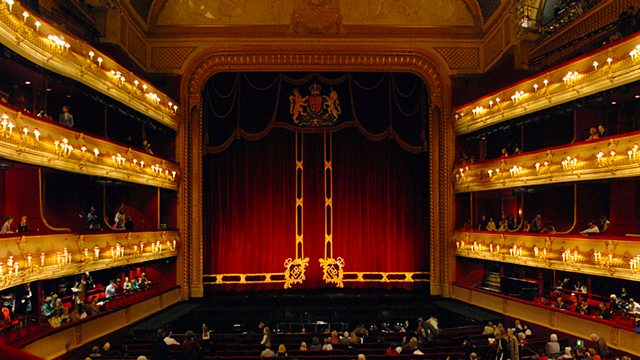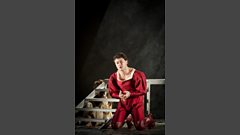
Thursday Opera Matinee: Verdi's Rigoletto
Verity Sharp introduces a performance of Verdi's opera Rigoletto, given at the Royal Opera House, Covent Garden, in 2012. Starring Dimitri Platanias and Ekaterina Siurina.
Thursday Opera Matinée: Verity Sharp introduces Verdi's tragic and provocative tale of the cynical court jester who, against his better nature, wreaks havoc with the lives of others. But then the tables are turned and he's doomed to bring about the death of the one person he holds most dear - his daughter Gilda. Dimitri Platanias is the hunchback jester, Ekaterina Siurina his daughter Gilda, and Vittorio Grigolo the handsome, amoral duke who poses as a penniless student to gain Gilda's love. John Eliot Gardiner conducts the Orchestra and Chorus of the Royal Opera, in a recording from 2012.
Duke Of Mantua ..... Vittorio Grigolo (tenor)
Rigoletto ..... Dimitri Platanias (baritone)
Gilda ..... Ekaterina Siurina (soprano)
Maddalena ..... Christine Rice (mezzo-soprano)
Sparafucile ..... Matthew Rose (bass)
Giovanna ..... Elizabeth Sikora (mezzo-soprano)
Monterone ..... Gianfranco Montresor (baritone)
Marullo ..... Zheng Zhou (baritone)
Borsa ..... Pablo Bemsch (tenor)
Count Ceprano ..... Jihoon Kim (bass-baritone)
Countess Ceprano ..... Susana Gaspar (soprano)
Usher ..... Nigel Cliffe (tenor)
Page ..... Andrea Hazell (mezzo-soprano)
Orchestra and Chorus of the Royal Opera
Conductor, John Eliot Gardiner.
Last on
Music Played
-
![]()
Giuseppe Verdi
Rigoletto Act I
Singer: Vittorio Grigolo. Singer: Dimitri Platanias. Conductor: Sir John Eliot Gardiner. -
![]()
Giuseppe Verdi
Rigoletto Act II
Singer: Vittorio Grigolo. Singer: Dimitri Platanias. Conductor: Sir John Eliot Gardiner. -
![]()
Giuseppe Verdi
Rigoletto Act III
Singer: Vittorio Grigolo. Singer: Dimitri Platanias. Conductor: Sir John Eliot Gardiner. -
![]()
Erich Wolfgang Korngold
Marietta's Lied (Die tote Stadt)
Orchestra: ����ý National Orchestra of Wales. Singer: Olena Tokar. Conductor: Tecwyn Evans. -
![]()
B.Tommy Andersson
Passacaglia
Orchestra: ����ý National Orchestra of Wales. Conductor: Thomas Søndergård.
Synopsis
Act I
Scene 1
The Duke of Mantua is hosting a feast at his palace and casting his eyes over every woman there. He tells his courtier Borsa that he has also seen in the church a young girl he means to have; he has had her followed and knows that she lives in a poor district of Mantua. Count Ceprano is leaving the party with his wife, when the Duke turns his attention to her, in front of her jealous husband, who is cruelly mocked by Rigoletto, the court jester. Another courtier, Marullo, rushes in with a fine new joke; it appears that the ugly, deformed Rigoletto is keeping a mistress. The Duke and Rigoletto openly discuss how to deal with the troublesome Ceprano; shall he be exiled or beheaded? Ceprano conspires with Marullo, Borsa and the other courtiers to take revenge on the jester who has made all of them the butt of his vicious jokes. The feast is interrupted by the arrival of Monterone, a nobleman whose daughter has already been seduced and abandoned by the Duke. Rigoletto taunts him mercilessly and the Duke orders Monterone’s arrest. Monterone damns them both, hurling a curse on the jester who can make sport of a father’s grief.
��
Scene 2
Rigoletto keeps a house in the city, under the walls of Ceprano’s palace. He is on his way to it, deeply troubled by Monterone’s curse, when he meets Sparafucile, a hired killer. Sparafucile has been watching the house, and knows that Rigoletto keeps a woman there. He guesses that the jester must be a man with rivals and enemies, and so offers his services. Rigoletto sends him away, but ascertains where and when he can find him in the future. Full of self-loathing, Rigoletto realizes he has much in common with the assassin, and rails against a fate that has cast him alone and deformed into a world where he must be a buffoon to survive.
��
It is not Rigoletto’s mistress but his daughter, Gilda, who lives in the house, and she rushes into his arms as he enters. She has been raised in the country ignorant of her parents and only recently brought to Mantua to be near her father. But he will answer none of her questions about her dead mother, or even tell her his own name. When she begs permission to go out into the city, he furiously denies it, terrified that the eyes of the court should fall on her. He orders Giovanna (the servant he has hired to take care of her) to watch his daughter well. They are overheard by the Duke, who is skulking in the shadows outside, disguised in poor clothes.
��
When Rigoletto leaves, Gilda is wracked with guilt: she has not told her father about the man whose eyes met hers in church, and who now fills her thoughts. It was the Duke in disguise, and Giovanna (who is already in his pay) now lets him into the courtyard. He passionately declares his love for Gilda, and she – though at first terrified – gradually gives in to him. He tells her his name is Gualtier Maldé, and that he is only a poor student. Giovanna hears footsteps outside and, fearing that it is Rigoletto returning, warns the Duke, who angrily leaves. The footsteps belong, however, to Marullo and Borsa, and as Gilda repeats the name of her lover over and over to herself in rapture, they are joined by Ceprano and the other courtiers. They have come to abduct the girl they believe to be Rigoletto’s mistress. But at that moment Rigoletto himself appears. Marullo hushes the others, and manages to convince Rigoletto that it is the wife of Ceprano they have come to kidnap from the palace across the street. Under the cover of the pitch black night, they blindfold Rigoletto and confuse him into holding the ladder by which they break into his own house and emerge dragging Gilda. Rigoletto doesn’t hear her distant screams, but touching his face he discovers Marullo’s trick and then the empty house. In anguish he remembers Monterone’s curse.
��
Act II
The Duke returned to see Gilda but found the house deserted. Now back in his palace, he angrily curses whoever has robbed him of his prize. He is wallowing in despair when his courtiers rush in to tell him about their exploits of the previous night. The Duke quickly guesses that Rigoletto’s ‘mistress’ and daughter are one and the same. The courtiers have locked her into a room; the Duke eagerly makes his way there.
��
Rigoletto roams the palace searching for Gilda while hiding his agony from the court, ��who slyly taunt him. A page’s innocent questions make it clear the Duke is already with Gilda. Rigoletto despairingly reveals that she is his daughter, then ferociously attacks the courtiers in his efforts to reach her. When they bar his way, he pleads with them to have
pity on him. Gilda herself now appears, throwing herself into his arms, weeping. Rigoletto orders the courtiers from the room, and in shame Gilda tells him everything that has happened between her and the man she now knows to be the Duke. Monterone is dragged past on his way to prison. He despairs that his curse on the Duke has proved futile, but Rigoletto swears to him that the hand of vengeance will strike the Duke down.
��
Act III
A month has passed and Rigoletto has planned his revenge. He waits with Gilda outside Sparafucile’s inn, which stands on the banks of the river Mincio. Sparafucile’s sister, Maddalena, who dances in the streets, has lured the Duke there for the night. He enters, again disguised (this time as a soldier) and asks Sparafucile for wine and for Maddalena.
Rigoletto holds Gilda up to the wall of the house so she can witness through a spy-hole the Duke’s infidelity. Gilda, who has remained in love with the Duke, is heartbroken. Rigoletto tells her to go home and, dressed in boy’s clothes, ride to an inn in Verona where he will join her in the morning.
��
Once Gilda has gone, Rigoletto agrees the price for the Duke’s murder with Sparafucile, planning to return for the body at midnight. Sparafucile, unaware of the Duke’s identity, asks the name of his victim. ‘He is Crime’, answers Rigoletto, ‘I am Punishment!’ A storm gathers as Sparafucile shows the Duke to an upper room, where he drifts off to sleep, awaiting Maddalena. She has fallen for the handsome soldier and tries to persuade her brother to let him live. He refuses, instead throwing her a sack to repair to receive the dead body.
��
Knowing that the Duke is there, Gilda has been drawn back to the house and listens outside. Maddalena proposes a plan to kill Rigoletto when he returns with the money, and so spare the young man’s life. Again, Sparafucile angrily refuses, but when pressed by Maddalena’s pleas he agrees to kill any traveller who comes to their door by midnight and present their body in the sack to Rigoletto instead. Torn between her father and the man she loves, Gilda chooses to die herself and knocks on the door. Maddalena opens it and Sparafucile drives his knife into Gilda’s heart as the heavens open above them.
��
At midnight, Rigoletto returns to claim his prize; Sparafucile drags out a heavy sack and urges him to throw it into the river at once, then quickly leaves. Rigoletto gloats over the body and has just begun to pull it towards the river when he hears the Duke singing in the distance. He opens the sack to discover the dying Gilda, who begs him to forgive her. She dies, and Rigoletto – recalling once more the curse of Monterone – falls over her body.
David McVicar
Broadcast
- Thu 22 Jun 2017 14:00����ý Radio 3


